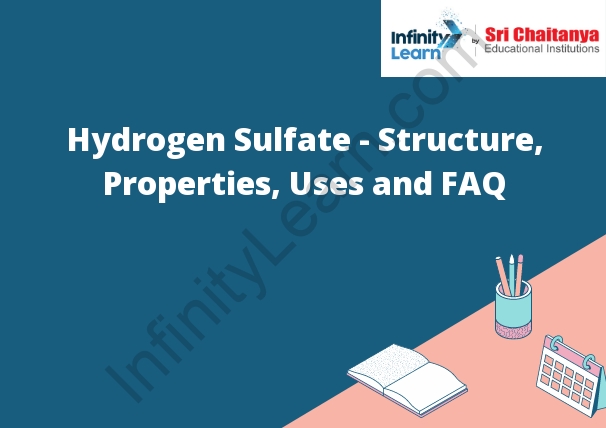Table of Contents
Introduction of Hydrogen Sulfate
Hydrogen sulfate is a soluble inorganic anion with the chemical formula HS−. The conjugate base, hydrogen sulfate, is a weak acid that dissociates in water to form hydrogensulfate ions and protons. It is a white crystalline solid that is slightly soluble in water. Hydrogen sulfate is produced industrially by the reaction of sulfur dioxide with water. The anion is also found in nature as a component of mineral springs and volcanic gases.
Hydrogen sulfate is a weak acid that dissociates in water to form hydrogensulfate ions and protons.
The anion is also found in nature as a component of mineral springs and volcanic gases.

Chemical Reaction of Hydrogen Sulfate
The reaction of hydrogen sulfate with water is a hydrolysis reaction. In this reaction, the hydrogen sulfate molecule splits into a hydrogen ion and a sulfate ion. The hydrogen ion is released into solution and the sulfate ion remains attached to the water molecule.
Uses of Hydrogen Sulfate
Hydrogen sulfate has a variety of uses, both in industry and in the home. It is a component of many industrial processes, including the manufacture of dyes, paper, and explosives. It is also used as a cleaning agent, a deodorant, and a sterilizing agent. In the home, hydrogen sulfate can be used to clean drains, remove stains, and deodorize air.
Structure of Hydrogen Sulfate
The structure of hydrogen sulfate is that of a salt. It is an anion of sulfuric acid, H2SO4, and a cation of hydrogen, H+. The hydrogen sulfate ion has a charge of -1 and consists of a hydrogen atom and a sulfate ion, SO42-.
Physical Properties of Hydrogen Sulfate
Molecular Weight
64.07
Density
1.92 g/mL
Boiling Point
205.8°C
Freezing Point
-72.3°C
Chemical Properties of Hydrogen Sulfate
Chemical Formula: H 2 SO 4
Molecular Weight: 98.07
Appearance: Colorless to slightly yellow liquid
pH: 1.8-2.2
Density: 1.84 g/mL
Boiling Point: 338.4°C
Solubility: Miscible with water
Hydrogen Sulfate Uses
Hydrogen sulfate is a colorless, corrosive, and soluble in water gas that is used in the manufacture of sulfuric acid, fertilizers, and other chemicals.
What is Sulfate?
Sulfate is an inorganic compound with the chemical formula SO4. It is a white solid that is very soluble in water. Sulfate is produced industrially by the burning of sulfur-containing materials, such as petroleum and coal. It is also found in natural deposits, such as gypsum and anhydrite.
What is Strong and Weak Acid?
A strong acid is a compound that dissociates completely in water to release hydrogen ions (H+). A weak acid is a compound that dissociates only partially in water to release hydrogen ions.
What are the Differences Between Hydrogen Sulfate and Hydrogen Sulfide?
The differences between hydrogen sulfate and hydrogen sulfide are their molecular weights, boiling points, and colors. Hydrogen sulfate has a molecular weight of 96.07 and a boiling point of 647.3 degrees Celsius. Hydrogen sulfide has a molecular weight of 34.01 and a boiling point of -60.5 degrees Celsius. Hydrogen sulfide is also a gas at room temperature, while hydrogen sulfate is a liquid. Hydrogen sulfide is also a colorless gas, while hydrogen sulfate is a colorless liquid.








